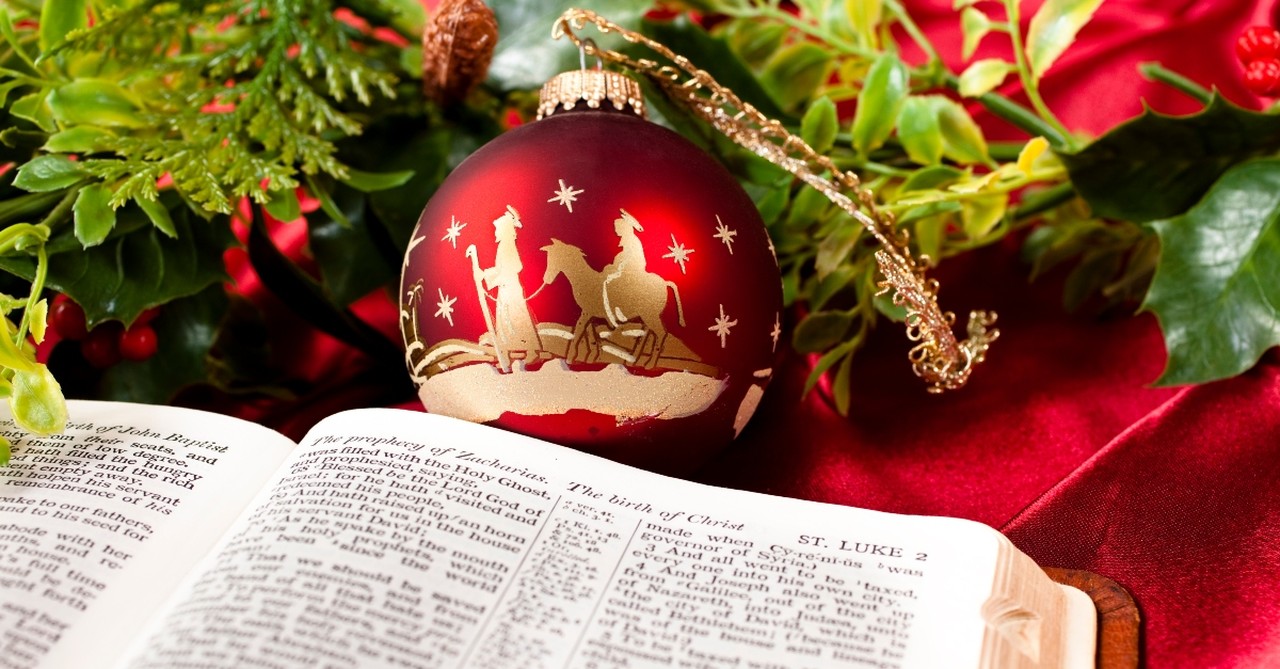5 Spiritual Disciplines to Focus on This Advent Season

A few years ago, I found myself unprepared for Advent. Somehow the season got lost in all the busyness of deadlines and tasks to finish. I wanted to purchase an Advent devotional, like God is in the Manger by Dietrich Bonhoeffer or The Dawning of Indestructible Joy by John Piper, but the days passed, and Advent came and went. I had no set Bible reading plan, Advent book, or scheduled time for quiet reflection outside of my daily devotional time. It was not that I did not know about practices that could reorient my focus on Jesus – I had failed to plan and be intentional about celebrating Advent.
Some people can still thrive with last-minute activities, but for most of us, we cannot expect events or changes to happen if we are not intentional about them. If we never choose to engage with Advent, we will miss it. And that is a loss since it is a beautiful season rich with meaning and hope.
During the four weeks leading to Christmas, we are called back into the ancient rhythm of the church to remember what Jesus did when He came into the world as Immanuel, the Word made flesh tabernacling with us. Our Savior has come and is coming again.
Therefore, this year, I am attempting to create a plan to engage with the rhythms and practices of Advent. To utilize spiritual disciplines to grow in my relationship with Christ – such as using a Bible reading plan, compiling some poems to read throughout the season, and deciding when I can carve in some extra time for prayer and solitude. I invite you to consider doing the same, not to create a rigid plan to mark off as a checklist, but to be intentional about celebrating Advent. For our Lord is coming soon, and we patiently await His return during this season, and throughout our lives.
Consider the following five spiritual disciplines as starting places to focus on during Advent this year.
Photo credit: Unsplash/Kelly Sikkema
1. Biblical Meditation and Memorization

1. Biblical Meditation and Memorization
SLIDE 1 OF 5
Most Christians know that reading Scripture is a part of Advent. Every year, churches revisit the opening chapters of Matthew and Luke to think about Jesus’ first coming. Other passages are typically included as well, such as the prophecies in Isaiah about the Messiah. We can easily read these parts of the Bible and assume we already know everything about them.
But what if we deliberately slowed down and gave ourselves time to think deeply about these truths? A spiritual discipline is supposed to be intentional. So, what if we deliberately applied ourselves to not only reading, but also meditating on Bible passages?
Unlike worldly forms of meditation, biblical meditation is about focusing on God’s Word. We do not seek to empty our minds, but to set our thoughts on the truth and promises of Scripture (Joshua 1:8; Psalm 1:1-2). What this looks like while reading is to pause regularly, and reread if needed, to absorb the passage. What does it teach, according to context? Was there a section that the Holy Spirit drew our attention toward? How does the truth apply in life? Are there promises to hold onto?
Memorization is often connected with meditation, so committing a specific verse to memory is an important way to regularly return to a verse and think about it throughout the day. For Advent, this may look like choosing a few verses or a passage to dwell on throughout the season. A combination of ones about Jesus’ first and second coming are important to include, turning our thoughts to the salvation He came to give and the restoration He will bring at His return. Perhaps we will choose to meditate on Isaiah 9:2 and John 1:4-5, or Matthew 1:21, 2:1-2, and Revelation 1:7. Our focus could even just be on a single verse, such as “The Word became flesh and made his dwelling among us. We have seen his glory, the glory of the one and only Son, who came from the Father, full of grace and truth” (John 1:14).
Regardless of the ones we choose to continually focus our thoughts on, the practice of intentionally dwelling on a passage helps us engage more with Scripture during the Advent season. If we allow it, the Bible will transform our thoughts. We will find ourselves thinking more of Christ’s return and preparing for it by serving Him (Matthew 24:44-47).
Photo credit: ©Getty Images-/stop123
2. Prayer

2. Prayer
SLIDE 2 OF 5
The faithful Israelites awaited the coming of the Messiah. One of these individuals was the prophetess Anna, a widow who devoted herself to serving the Lord. She spent her entire life waiting to see the coming of Christ. And as she waited expectantly, she fasted and prayed (Luke 2:36-38). The interim period was not merely a time to sit idly by, but to be devoted to the Lord. Anna, and surely several others, had committed to praying while they waited for the Messiah’s coming.
Likewise, we long and wait for Jesus’ second coming. Almost 2,000 years have passed since Jesus ascended, and believers have been patiently waiting for His promised return ever since. This interim period of waiting can be difficult. We may feel as if the years keep passing away. Will He come before we die? Yet, Anna’s example, and that of Elizabeth, Zechariah, and Simeon, show us that we can be faithful in the waiting. To serve the Lord with expectation of His coming. To pray and not give up.
The discipline of prayer invites us to commune with our Lord, telling Him our hopes and fears while also offering Him praise and thanksgiving. Prayer deepens our relationship with God and allows us to intercede for others. We will find that talking to our Lord regularly without distraction is a struggle, but we grow spiritually when we, like Anna, commit ourselves to prayer.
During Advent, our prayers may take a different shape. We may find ourselves wanting to focus our prayers on Jesus’ return and His Kingdom – adding our voices to the many believers around the world who are praying “Maranatha!” To do this, we can pray portions of Psalms or other Bible passages, as well as utilize written prayers.
As we wait for the joy of Christmas, and the coming of the Lord, may we devote ourselves to regularly communing with the Lord through prayer.
Photo credit: ©Getty Images/fermate
3. Celebration

3. Celebration
SLIDE 3 OF 5
The holiday season is filled with festivities that we observe with family and friends: decorating, baking cookies and other treats, watching Christmas movies together, and venturing out at night to view light displays. The spirit of celebration is inherent to this season, but it is also a spiritual discipline we can include in our Advent practices. All that is needed is some planning and creativity.
Celebration as a spiritual discipline might seem contradictory since discipline often invokes ideas of strict practices. However, this discipline is seen throughout the Bible when followers of God met together to worship Him, observe festivals, and partake in love feasts and communion. Centered in this practice is the worship of the Lord. We attend church because we love the Lord and want to meet with other believers to praise Him. We eat the bread and drink the wine to remember what our Savior did for us, and to declare His sacrificial death until His return (1 Corinthians 11:26). The Lord God should be the focus of our festivities.
During Advent, there are many ways to practice this discipline. Families or a group of friends could set up an Advent wreath at home, light the corresponding candle (or candles) each night, and offer a prayer or sing a hymn. We could also plan to set aside a day each week to hold a special meal that points us to the day we will eat with Christ in His Kingdom (see Isaiah 25:6; Luke 22:16). Many Christians traditionally host such a meal on each Sunday of Advent.
Part of celebrating as a spiritual discipline should also involve meeting with other believers. So, taking time to attend festive church gatherings and meals is another way to engage with this practice. Lots of churches hold services for each week of Advent, marked by the lighting of the candles on the Advent wreath. Often, a candlelight service is included within this time.
Meeting with others to worship the Lord during Advent enables us to share the joy and hope of the season and spur one another on toward faithful service as we await the coming of Christ.
Photo credit: ©Getty Images/evgenyatamanenko
4. Giving

4. Giving
SLIDE 4 OF 5
Another practice to help us grow closer to the Lord during this period of waiting is through giving. This is because generosity stems from gratitude for what we have in Christ and wanting to offer our resources back to Him as an act of worship and love. Our relationship with the Lord transforms how we approach giving – especially during the Christmas season when generosity is expected.
Many people can treat the act of giving as a duty or merely another checklist on their Christmas to-do list. For the follower of Jesus, though, giving is an extension of the grace we have been shown. As the Apostle Paul wrote in 2 Corinthians 8:9, “You know the generous grace of our Lord Jesus Christ. Though he was rich, yet for your sakes he became poor, so that by his poverty he could make you rich.” Our generosity is different than the world’s, in that we give because our Lord has given us the greatest gift – salvation from sin. We give from a basis of love and gratitude to Christ.
Investing in eternity through generously using our resources for the glory of God is a wise practice for Advent. We are waiting for Jesus’ return, and He has told us to be ready (Matthew 24:42-44). We do not want to be like the wicked servant (Matthew 24:48-51), the foolish virgins (Matthew 25:1-13), or the servant who failed to multiply the money entrusted to him (Matthew 25:24-30). God has given us all abilities, gifts, opportunities, and financial resources of varying degrees. And we are all responsible for how we use, or do not use, these opportunities to serve our Lord.
This Advent season, we can obey Jesus’ words to be ready and keep watch by practicing the spiritual discipline of giving. Are there items we no longer need, and which are still in good condition, that we could donate to an organization for others to use? Can we simplify our shopping to give more to a Christian ministry or organization? How can we use our time and talents to bless and serve others?
If we desire an integrated approach to giving this Christmas, we could create an Advent calendar in which we “unwrap” a new idea each day to serve someone else generously. For instance, we could give our time by visiting an elderly and lonely neighbor one day, cook a meal for someone in our church who is sick or recovering from surgery another day, donate generously to help a local or worldwide ministry, and so on until the end of Advent. The more we look for ways to give of ourselves in loving service to the Lord this season, the more ideas we will discover.
Photo credit: ©Getty Images/CentralITAlliance
5. Silence and Solitude

5. Silence and Solitude
SLIDE 5 OF 5
“Hectic” is the word that lots of us would use to describe the holidays. Sure, there are numerous festivities that we enjoy, but sometimes the busyness can be overwhelming. We begin to wonder if we really need to schedule in all those shopping trips or to sign up to bake Christmas treats for the Bible study group. Hundreds of tasks and activities vie for our attention and focus; peace seems far away.
To combat the temptation to join the frenzy of activity known as the Christmas season, we need to intentionally take time to get alone in quietness. Turn off the screens and task reminders and instead, get away with our Lord (see Mark 6:31). As it is, Christ’s first advent was to lowly Bethlehem born of the virgin Mary, and not announced by trumpets or the world’s royal heralds (Luke 2:4-7). We can better reflect on the peace Jesus brought that day by seeking solitude and quieting ourselves.
The spiritual disciplines of silence and solitude are meant to facilitate a closer walk with the Lord. We get away to commune with Him in prayer and listen for His guidance. Then, after the period is over, whether it is five minutes or an hour, we will come away spiritually recharged and ready to invest in what truly matters during Christmas – loving our Lord and others in everyday life.
By entering that hushed stillness away from distractions, we choose to focus on our Savior and spend time with Him amid the hectic flurry of Christmas activities.
Photo credit: ©Getty Images/Mkovalevskaya

Originally published December 02, 2024.









